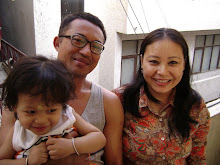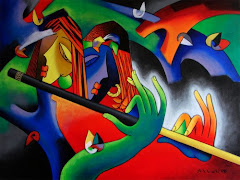 Some visuals haunt you forever, some sound wakes you up untimely and some story lingers to remind you of the obvious and unusual. Mami Sami encapsulates these seemingly vulnerable human dramas and magnificently renders them in idioms sensible to popular consciousness. Once again, Lancha Ningthouja has proved the infallibility of a strong storyline, an age-old wisdom in moving art, and how a tight line of direction can bring out desired performances from the actors (Sadananda Hamom, Binata Laishram, Venus Philem, RK Kaiku, Ningthoujam Reena, Devita Urikkhinbam, Mayengbam Akshyakumar, Swamikumar, Homeshori and Dhanbir Leishangthem). Unity and flow of the film is maintained through careful editing unlike other contemporary Manipuri digital films, where seamless flow into the next scene is rare. The film shall remain as the yardstick of excellence in modern Manipuri digital cinema in times to come.
Some visuals haunt you forever, some sound wakes you up untimely and some story lingers to remind you of the obvious and unusual. Mami Sami encapsulates these seemingly vulnerable human dramas and magnificently renders them in idioms sensible to popular consciousness. Once again, Lancha Ningthouja has proved the infallibility of a strong storyline, an age-old wisdom in moving art, and how a tight line of direction can bring out desired performances from the actors (Sadananda Hamom, Binata Laishram, Venus Philem, RK Kaiku, Ningthoujam Reena, Devita Urikkhinbam, Mayengbam Akshyakumar, Swamikumar, Homeshori and Dhanbir Leishangthem). Unity and flow of the film is maintained through careful editing unlike other contemporary Manipuri digital films, where seamless flow into the next scene is rare. The film shall remain as the yardstick of excellence in modern Manipuri digital cinema in times to come.Has anyone of us pondered about the misery that lies behind a beautiful object, place or a smile? Just as a captivating smile can hide trillions of emotions – pain & suffering, lost & longing – the magnanimous Loktak in all its beautiful glory hides behind it humans struggling to eke out a daily existence. Mami Sami portrays the corruption of this idyllic place by victims of the time and is in fact a battle ground of low intensity armed conflict. For the first time in a Manipuri cinema, culture, lifestyle, poverty, common daily existence of the place has been beautifully presented to the audience to savour and remember for a lifetime. Common ethos of population, where poor and the rich mingle on equal footage is cleverly presented in few scenes in the movie – one pertains to a hospital scene where the injured (of a rally) are not differentiated on class or social position and another where Tayal’s (main protagonist of the story) attire in Mayek Naiba and Moirang phee during a Lai Haraoba procession was good as any other women’s from the rich family. There is another captivating scene – of an early morning, misty and blurred, when villagers of the landless floating hutments come out on their canoes to sell their goods. Canopy of the tall eucalyptus trees against the background of the misty lake is a sight to behold; not to forget the haunting chanting of ancient song rhythmically apaced by the frantic strumming of the penna as a background score. One is reminded of masterworks of Akira Kurusawa for the sheer visuals and sound attempted by Lancha Ningthouja and even the complexity of the plot, although he cannot shake himself completely free from the dictate of commercial movie making.
Mami sami should also be appreciated for its creative efforts at a time marked by strictures and bans in Manipur. I am reminded of some of the creative movements in arts, architecture, cine-making and literature during some of the regimented eras in human history. For example, MaCarthism will always remain proof of the extremes to which a regime can go and suffocate freedom of the individuals. But it was also the era in which one witnessed birth of some of the most creative artists in American history. Or take the case of Alexander Solzhenitsyn during the Stalin era. These are obvious reminders of how repression can foster creativity in individuals. Instead of blind imitation of the mainstream Bollywood genre of movies Lancha has attempted a movie which is local in taste and hit the popular psyche.
But, what is Mami sami all about? Well, many of my friends say it’s about the struggle of a bubbly poor girl, who lost her first lover, become a widow, marry the first lover and then one fine day realizes her first husband is alive. This is set at the backdrop of armed conflict in Manipur and how conflict tears apart hope and very existence of the individuals. Very true, but at a deeper level it tells us the complexity of human emotions. Woman (already a victim) is victimized and deceived by the “time” we live in. This is an issue which has never come to the fore of discussion by intellectuals and feminists, although everyone symbolically hold dear to the fallacy that women are the empowered and heroines of Manipur – vanguard of human rights. Although the movie could have ended when Wangthoi (male protagonist) slapped Tayal when she attempted suicide, the repeated reminder on the part of Lancha is to stress the point that woman’s emotional trauma/suffering has not been recognized at least in the public domain as of today. I find this stating the obvious a necessary part of the movie.
Overall, Mami sami is an example to show to the world that Manipuri digital cinema has come of age. Salute to the crew of Mami sami.





3 comments:
oh. i was reading it this morning frm e-pao and thought of giving a link as i dont know you have it posted here, for other's benefit. to be frank, i dont have words to ineterpret the closing lines, and luckily you have got it: Victims of the time. it says it all. thnx.isn't Binata good? i am floored. m thinking if she blogs.
lovely post...after reading this and Jayanta's post, I feel, this is a must-watch...the only problem, will have to wait for sometime until someone from home brings a CD...sigh...
Just happened to watch the movie few days back.Loved the movie.A perfect portray of present day situation in Manipur. Common man feeling the heat from both ends. Truly victims of time! Thanks for the nice review. Keep up the good work.
Post a Comment